

Write a report. This is no time to be suggesting more work for any exhausted educator.
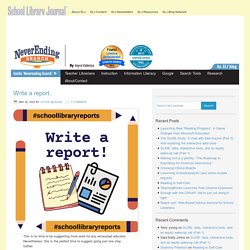
Nevertheless, this is the perfect time to suggest going just one step further. Please write an annual report. Now, more than ever, it matters. For some of you, this is a regular, end-of-year ritual from which you pull on notes, photos, and videos collected over the months. For some of you, this is a task in which you never before engaged. I know how hard so many of you worked to support students, teachers, and administrators during the crisis. Why a report? It ensured that others recognized the impact of my work on our learning culture. Why now? Here are several compelling reasons why this is the year you must start documenting your impact.
It’s important that any report reflects on both pre-pandemic and during pandemic activity. School boards will be negotiating crisis budget decisions between now and July 1. It doesn’t have to be lengthy. Choose a favorite platform: How Good is Our School Library? Case Study 1: Introducing new activities and increasing learner engagement is a good example of how library staff can have an impact on learning, teaching and assessment.
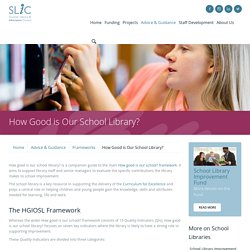
In this instance, the S2 library programme was redesigned – introducing the concept of pupils making their own book trailers. Feedback from S2 pupils had shown library periods were considered boring and repetitive. Engagement was also low, with many pupils seeing the library as a social setting rather than an opportunity to engage with literacy. With resources and training provided by the Scottish Book Trust, pupils watched various trailers and discussed their merits before going on to make their own. Following feedback from both pupils and teachers, the project now includes peer-to-peer reviews and a competition where teaching staff vote for their favourite book trailer. Case Study 2: In this case study the local public library helped school pupils produce their very own books. The Absolutely True Adventures of a School Librarian.
While surfing social media sites I come across great posts with equally insightful comments.
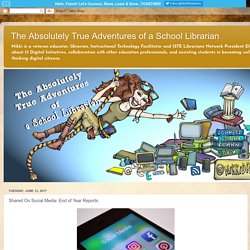
Unfortunately, trying to locate these posts in the stream months later is often an impossible task. Thus, in lieu of waiting for the original poster to blog their thoughts, I am starting a series here entitled "Shared On Social Media" so that I can find the information I found useful later. All credit will be given to the original poster and commenters. None of these posts are my original thoughts. Posted to the Future Ready Librarians Facebook Group on June 9, 2017 by Brad Malone. As a LMS turned administrator, I have spent a lot of time looking at all of your end reports and wondering what I would think or feel if I received one from any of the LMS I oversee. Who is the audience? As is so often the case, when I'm struggling with a LMS issue I turn to Doug Johnson.
Annual report. What difference has your library and its services made to student learning? What were the year’s highlights and which areas need future development? How do you know? For each area of content you include in your report, you'll need evidence gathered over the course of the year. Explain how this evidence shows positive outcomes for your students, staff and school community. Keep your intended audience in mind while you’re writing the report. The following topics are a guide. Rationale for your school library Summarise the library's role in supporting your school’s vision for student learning. Library guiding documents Highlights of the past year Share the main highlights of the year — celebrate your successes! Library statistics Summarise key information about how students, teachers, parents or whānau and your school community use the library: Developing readers Show how your library has contributed to the building of a school-wide reading culture.
Strategies to engage students as readers. Connecting the Dots Between Your Library And Student Learning. My last principal used to call May "the month of mayhem.
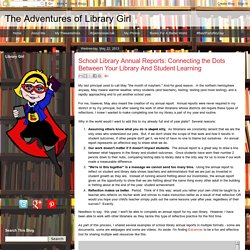
" And for good reason. In the northern hemisphere anyway, May means warmer weather, antsy students (and teachers), testing, testing (and more testing), and a rapidly approaching end to yet another school year. For me, however, May also meant the creation of my annual report. Annual reports were never required in my district or by my principal, but after seeing the work of other librarians whose districts did require these types of reflections, I knew I wanted to make completing one for my library a part of my year end routine. Advocate for your school library program with an annual report. As school libraries are winding down at the end of the school year, collecting overdue books, weeding old equipment, and getting ready to shutter the doors for the summer, this is the perfect time for school librarians to think about drafting an annual report.
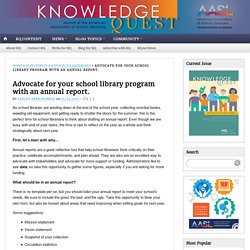
Even though we are busy with end-of-year tasks, the time is ripe to reflect on the year as a whole and think strategically about next year. First, let’s start with why… Annual reports are a great reflection tool that help school librarians think critically on their practice, celebrate accomplishments, and plan ahead. They are also are an excellent way to advocate with stakeholders and advocate for more support or funding. Administrators like to see data, so take this opportunity to gather some figures, especially if you are asking for more funding. Tejeda MS Library.